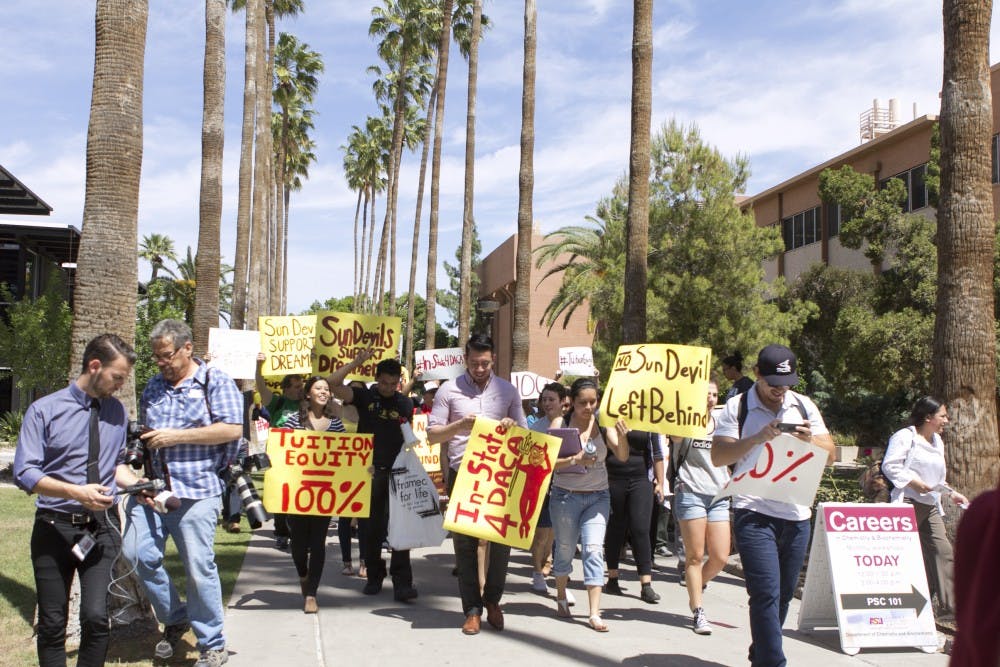A May ruling by the Arizona Board of Regents granted Deferred Action for Childhood Arrivals recipients the ability to pay in-state tuition. Despite this ruling, many DREAMers still continue to struggle financially due to the lack of federal aid available to undocumented students.
May’s ruling overturned a two-year long court battle over the tuition issue for undocumented students, after then-Attorney General Tom Horne (R) filed a lawsuit against Maricopa Community Colleges for charging DACA recipients the in-state tuition rate. Horne said he believed the policy violated Proposition 300, a 2006 proposition that restricted in-state tuition to legal residents.
Before the ruling, DACA recipients living in Arizona hadn't been allowed to pay in-state tuition, which was a burden for many students who also could not apply for jobs due to their immigration status.
German Cadenas, a fifth-year graduate student studying counseling psychology and founding member of the Arizona DREAM Act Coalition, was a major supporter of the ruling and even spoke at a University press conference celebrating the victory.
Although the ruling has given undocumented college students many privileges, such as attending a university or applying for a job, there is still much work to be done, Cadenas said.
“When our underserved students do well, we all do well, and Arizona increases its chances to thrive economically,” Cadenas wrote in an email. “I think the next step is to figure out how to ensure that DREAMers have access to scholarships and funding that other AZ high school graduates benefit from.”
Although he arrived in Arizona from Mexico in 2001, urban planning senior Enrique Bojorquez received his DACA status in 2013 after a six-month long application process. Since the ruling, Bojorquez said he has been able to vigorously pursue a higher education.
“It’s something that has affected me tremendously, even though it’s something they barely put in effect,” Bojorquez said. “Currently, I’m going (to school) full-time, taking 16 credits, which is a substantial amount compared to before. I was only taking six credits at maximum.”
Bojorquez said he hopes to earn his bachelor’s degree, find a job in urban planning and hold public office one day, all of which is more attainable now that he is paying the in-state tuition rate.
“Being able to pay for (in-state) tuition has allowed me to get ahead in my degree,” he said. “This past summer, I was taking nine credits and now I’m taking 16 credits, so I’m taking full advantage of this opportunity.”
Belen Sisa came to the U.S. with her mother at age 6 on a Visa during an unstable economic period in her home of Argentina.
Today, as a political science sophomore at Chandler-Gilbert Community College, Sisa said her DREAMer status has made attending school very difficult, especially as she prepares to transfer to ASU in the spring.
“As a (DREAMer), I cannot apply for financial aid and there are not very many available scholarships, due to the fact that most applications as for the applicant to be a permanent resident or U.S. citizen,” she said in an email.
Non-resident students attending ASU for the 2015-16 school year can pay up to $40,000 a year in tuition and fees, room not included. In comparison, resident students could pay up to $25,000 in tuition and fees, room not included.
Because students must be U.S. citizens to qualify for financial aid, DACA recipients cannot receive federal or state aid and must apply for scholarships offered through private companies or foundations.
Cristina Graham, director of operations for the Cesar Chavez Foundation education fund, said the foundation's Tostitos Cesar Chavez Latino Scholarship Fund was set up in order to assist Latino students with education funding.
"(DACA recipients) had to pay international or out-of-state fees, and those are really high," she said. "The majority of those students have a really hard time to even afford to go to college, so we decided to make our scholarship a substantial amount."
Graham said a higher education is important for all students, no matter their citizenship status.
"I think it's important for everybody to go to college," she said. "The foundation that an education builds is crucial to the success that you give to yourself, to your family, to the community. I think it's important that we encourage all students, no matter what their status is, to attend higher education."
Although there are still battles to be fought and won regarding undocumented students, Bojorquez said DREAMers just want the same ability to attend school as other in-state students.
“We just want to earn our degree, give back to our community, help our family,” he said. “We’re just like any other resident here in Arizona. We contribute to the state here and it would be nice if we were able to receive some financial aid.”
Related Links:
Cost of tuition still an issue for ASU DREAMers
Arizona DREAMers, supporters celebrate in-state tuition ruling
Reach the reporter at Jlsuerth@asu.edu or follow @SuerthJessica on Twitter.
Like The State Press on Facebook and follow @statepress on Twitter.




